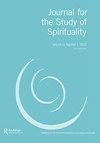‘Walking into the rock … ’: Labyrinth experience as thin place and [spi]ritual direction
IF 0.8
0 RELIGION
引用次数: 1
Abstract
ABSTRACT This article offers findings from a small study of staff and student experiences in a tertiary educational context at Tabor Institute of Higher Education, South Australia. Participants were invited to complete three curated labyrinth walk and reflection activities over a period of three months as an extra-curricular opportunity for experiential spiritual practice. Analysis of the rich narrative data from participants’ experiences reveals the potential of the labyrinth ritual to enable transformative insights of significant depth and meaning to individuals. Three of the themes which emerged from the data are presented in this article. The first relates to a heightened sense of the dissolution of individual identity into a greater sense of connectivity or fusion with, and to, elements of nature, such as rock, water, and sand. The second speaks of deep emotional connection and processing of a pivotal, personal historical turn in spiritual awareness. The third relates to a movement into unusual peace, a sense of the living and fluid nature of time and space, and the agency of ritual practice as active and something that is ‘at work in the person’ rather than passive, with the person doing the work of the ritual. The researchers were struck by two phenomena in the process. Firstly, the poignant efficacy of non-didactic ritual for spiritual education and growth. Secondly, the interactive and dynamic relationship between the desire of the participants for deep experience, the actual practice of the labyrinth walk, and the importance of mindfulness and context-sensitive curation of the events.“走进岩石 … ’: 迷宫般的体验作为稀薄的地方和[spi]仪式的方向
摘要本文提供了南澳大利亚塔博高等教育学院一项关于高等教育背景下教职员工和学生经历的小型研究的结果。参与者被邀请在三个月的时间里完成三次精心策划的迷宫漫步和反思活动,作为体验式精神实践的课外机会。对参与者经历中丰富的叙事数据的分析揭示了迷宫式仪式的潜力,可以使个人获得具有重大深度和意义的变革性见解。本文介绍了数据中出现的三个主题。第一个涉及个人身份的高度溶解感,与岩石、水和沙子等自然元素的连接或融合感。第二部分讲述了深刻的情感联系和精神意识中一个关键的、个人历史转折的过程。第三个涉及到一种进入不同寻常的和平的运动,一种对时间和空间的生存和流动性质的感觉,以及仪式实践作为主动的和“在人身上起作用”而不是被动的行为,由人来完成仪式的工作。研究人员在这个过程中被两种现象所震撼。首先,非说教仪式对精神教育和成长的深刻影响。其次,参与者对深度体验的渴望、迷宫式步行的实际实践以及正念和情境敏感的活动策划的重要性之间的互动和动态关系。
本文章由计算机程序翻译,如有差异,请以英文原文为准。
求助全文
约1分钟内获得全文
求助全文
来源期刊

Journal for the Study of Spirituality
RELIGION-
CiteScore
2.50
自引率
7.10%
发文量
25
期刊介绍:
Journal for the Study of Spirituality is a peer-reviewed journal which creates a unique interdisciplinary, inter-professional and cross-cultural forum where researchers, scholars and others engaged in the study and practices of spirituality can share and debate the research, knowledge, wisdom and insight associated with spirituality and contemporary spirituality studies. The British Association for the Study of Spirituality (BASS) organises a biennial international conference and welcomes enquiries about membership from those interested in the study of spirituality in the UK and worldwide. The journal is concerned with what spirituality means, and how it is expressed, in individuals’ lives and communities and in professional practice settings; and with the impact and implications of spirituality in, and on, social policy, organizational practices and personal and professional development. The journal recognises that spirituality and spiritual values can be expressed and studied in secular contexts, including in scientific and professional practice settings, as well as within faith and wisdom traditions. Thus, Journal for the Study of Spirituality particularly welcomes contributions that: identify new agendas for research into spirituality within and across subject disciplines and professions; explore different epistemological and methodological approaches to the study of spirituality; introduce comparative perspectives and insights drawn from different cultures and/or professional practice settings; aim to apply and develop sustained reflection, investigation and critique in relation to spirituality and spiritual practices; critically examine the values and presuppositions underpinning different forms of spirituality and spiritual practices; incorporate different forms of writing and expressions of spirituality.
 求助内容:
求助内容: 应助结果提醒方式:
应助结果提醒方式:


